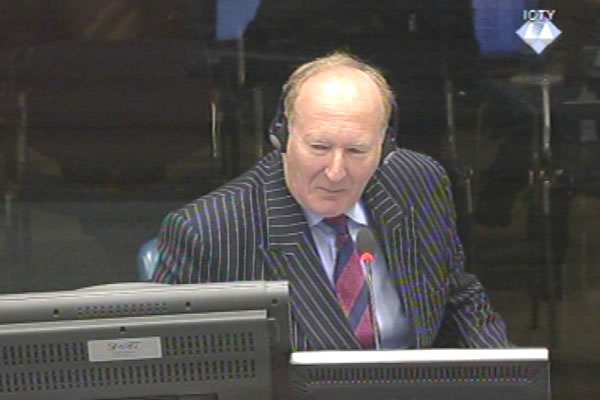Home
‘HOSTAGE OPERATION’ RUN BY TOP VRS ECHELON
Former commander of the Welsh battalion serving in UNPROFOR Jonathan Riley described at Ratko Mladic’s trial how his soldiers were captured in the spring of 1995 and placed around VRS facilities to prevent NATO air strikes. The prosecution showed a document indicating that the hostage-taking operation was run from the VRS Main Staff
 Jonathan Riley, witness at the Ratko Mladic trial
Jonathan Riley, witness at the Ratko Mladic trial In May 1995, British general Jonathan Riley commanded the 1st Battalion of the Royal Welsh Fusiliers. His unit served in UNPROFOR in Bosnia. Thirty-three of his soldiers were taken hostage by the VRS. As he testified at the trial of Ratko Mladic, he said that six hostages were wounded in a traffic accident and taken to the Visegrad hospital. The remaining 27 were placed around the VRS depots and other facilities as a human shield.
As the witness said, the objective of the hostage-taking operation was to prevent NATO from pursuing an air campaign against Serb positions, launched on 25 and 26 May 1995 because the Bosnian Serbs had violated the cease-fire agreement and attacked Sarajevo and Gorazde. The hostage taking operation is one of the fourth joint criminal enterprises that the former VRS commander is charged with.
Riley was not among the hostages, but he spoke to the soldiers from his battalion after their release in Bugojno. They told him that after their capture they were held in VRS facilities, from Bileca in the south to Rogatica and Zvornik in the north.
An order issued by the VRS Chief of Staff Manojlo Milovanovic on 27 May 1995 shows, according to the prosecution, that this was an action organized with great precision by the top Bosnian Serb political and military echelons. Last week, the defense argued that the hostages were taken by groups of isolated ‘Chetnik fanatics’ acting of their own accord. Milovanovic orders his troops to place captured UN members around VRS depots and other facilities in order to deter NATO from launching air strikes. The witness confirmed that the Welsh officers and soldiers were treated like that. A document of the Drina Corps operationalizing the VRS Main Staff order was also admitted into evidence.
According to the prosecution, the fact that on 2 June 1995 Mladic ordered the release of the six wounded Welsh UNPROFOR soldiers showed that Mladic controlled the hostages’ fate. In the cross-examination, the defense argued that the order had been issued by the supreme commander, Radovan Karadzic, and that Mladic had merely implemented it. Riley concurred and explained that in the chain of command, the supreme commander issues orders, carried out by his subordinates.
Defense counsel Branko Lukic put it to the witness that the Welsh battalion was biased, because it supported the BH Army in Gorazde. The witness explained that impartiality did not mean treating all the warring sides equally, but implementing the mandate: to keep the enclave safe and protect civilians in the enclave. The defense showed a document in which the UNPROFOR commander in BH, General Smith states his forces ‘are very close to becoming an ally of the BH Government’ because the Serb side had violated the peace agreement. The document was written after the hostage crisis, after the unlawful treatment of the UN peace-keepers by Mladic’s troops ended, Riley replied.
Ratko Mladic’s trial will continue on Monday.
Linked Reports
- Case : Mladic
- 2013-10-23 WITNESS ILL, MLADIC’S TRIAL ADJOURNED
- 2013-10-22 PROSECUTION BEGINS CALLING EVIDENCE ON UN HOSTAGES
- 2013-10-21 MLADIC’S CURSING IN COURT
- 2013-10-28 EVIDENCE FROM ORAHOVAC MASS GRAVES
- 2013-10-29 HUMILIATED AND LET DOWN
- 2013-11-05 MLADIC’S DEFENSE CONTESTS EXPERT FINDINGS ABOUT MARKALE 2
